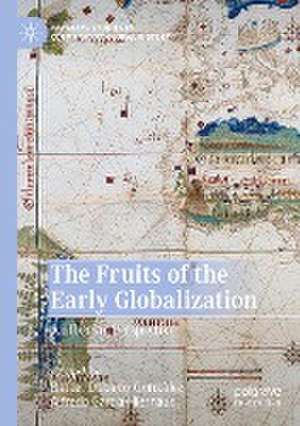The Fruits of the Early Globalization: An Iberian Perspective: Palgrave Studies in Comparative Global History
Editat de Rafael Dobado-González, Alfredo García-Hiernauxen Limba Engleză Paperback – 4 iun 2022
The book combines approaches from different disciplines, including quantitative and non-quantitative economic history, econometrics, international trade and demography. Overall, the vision of the Early Globalisation offered in this book is less pessimistic than in mainstream literature on the period.
| Toate formatele și edițiile | Preț | Express |
|---|---|---|
| Paperback (1) | 891.17 lei 6-8 săpt. | |
| Springer International Publishing – 4 iun 2022 | 891.17 lei 6-8 săpt. | |
| Hardback (1) | 894.97 lei 6-8 săpt. | |
| Springer International Publishing – 3 iun 2021 | 894.97 lei 6-8 săpt. |
Preț: 891.17 lei
Preț vechi: 1086.79 lei
-18% Nou
Puncte Express: 1337
Preț estimativ în valută:
170.58€ • 185.35$ • 143.38£
170.58€ • 185.35$ • 143.38£
Carte tipărită la comandă
Livrare economică 21 aprilie-05 mai
Preluare comenzi: 021 569.72.76
Specificații
ISBN-13: 9783030696689
ISBN-10: 3030696685
Ilustrații: XXVI, 314 p. 62 illus., 36 illus. in color.
Dimensiuni: 148 x 210 mm
Greutate: 0.45 kg
Ediția:1st ed. 2021
Editura: Springer International Publishing
Colecția Palgrave Macmillan
Seria Palgrave Studies in Comparative Global History
Locul publicării:Cham, Switzerland
ISBN-10: 3030696685
Ilustrații: XXVI, 314 p. 62 illus., 36 illus. in color.
Dimensiuni: 148 x 210 mm
Greutate: 0.45 kg
Ediția:1st ed. 2021
Editura: Springer International Publishing
Colecția Palgrave Macmillan
Seria Palgrave Studies in Comparative Global History
Locul publicării:Cham, Switzerland
Cuprins
1 Introduction.- 2 Early Globalization: Arguments and Evidence.- 3 Harbingers of Modernity: an Iberian perspective.- 4 Silver production, prices and globalization in the eighteenth century.- 5 The Austrian mining industry and the Iberian globalization.- 6 The Manila Galleon and the Age of Trade.- 7 The reception of Asian textiles in Portugal and Brazil: impact and consequences (1500- 1800).- 8 Oriental Goods in New Spain: Trade, Fashion, Race, and Consumption.- 9 The Trade and the Consumption of European products at the beginning of 18th century in New Spain based on Jean de Monségur’s memoirs”.- 10 Iberian Empires & Transatlantic Migration 1492-1808.
Notă biografică
Rafael Dobado-González is Professor of Economic History, Complutense University of Madrid, Spain. He was Tinker visiting Professor at the Institute for Latin American Studies, Columbia University, New York, USA, in the second semester of 2010, and visiting scholar at the David Rockefeller Center for Latin American Studies, Harvard University, USA, on several occasions. He has numerous publications in economic history journals and books.
Alfredo Garcia-Hiernaux is Associate Professor at Universidad Complutense de Madrid, Spain and researcher at Complutense Institute of Economic Analysis (ICAE). His research interests include econometrics and economic history.
Alfredo Garcia-Hiernaux is Associate Professor at Universidad Complutense de Madrid, Spain and researcher at Complutense Institute of Economic Analysis (ICAE). His research interests include econometrics and economic history.
Textul de pe ultima copertă
This book presents an unusual view on one of the most influential periods in world economic history: the Early Globalization. By this term, the notion that a process of genuine globalization took place in the Early Modern Era is defended. The authors propose that the canonical globalization—that of the nineteenth and early twentieth centuries—was preceded by a century-long increasing economic integration between continents that were non-existent before 1492. The economic aspects of the Early Globalization, like market integration, price co-movements and international silver circulation, were very important. Notwithstanding, other dimensions of human life, which were affected by unprecedented intercontinental contacts, including free and forced migrations, changes in tastes and consumption, etc. The Fruits of Globalisation deals with some of the most important issues among the former and the latter.
The book combines approaches from different disciplines, including quantitative and non-quantitative economic history, econometrics, international trade and demography. Overall, the vision of the Early Globalisation offered in this book is less pessimistic than in mainstream literature on the period.
The book combines approaches from different disciplines, including quantitative and non-quantitative economic history, econometrics, international trade and demography. Overall, the vision of the Early Globalisation offered in this book is less pessimistic than in mainstream literature on the period.
Rafael Dobado-González is Professor of Economic History, Complutense University of Madrid, Spain. He was Tinker visiting Professor at the Institute for Latin American Studies, Columbia University, New York, USA, in the second semester of 2010, and visiting scholar at the David Rockefeller Center for Latin American Studies, Harvard University, USA, on several occasions. He has numerous publications in economic history journals and books.
Alfredo Garcia-Hiernaux is Associate Professor at Universidad Complutense de Madrid, Spain and researcher at Complutense Institute of Economic Analysis (ICAE). His research interests include econometrics and economic history.
Alfredo Garcia-Hiernaux is Associate Professor at Universidad Complutense de Madrid, Spain and researcher at Complutense Institute of Economic Analysis (ICAE). His research interests include econometrics and economic history.
Caracteristici
Covers a variety of aspects, including economy, demography, consumption and art, and provides attractive illustrations Becomes the first book on Early Globalization from an Iberian perspective Incorporates well known authors in the field









